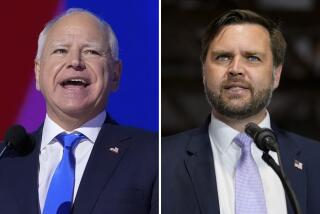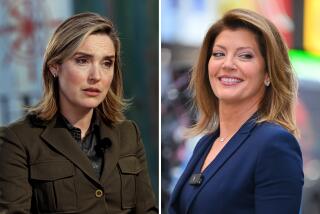Parties Sign Presidential Debate Pact : Chairmen Admit They Can’t Force Candidates to Appear
- Share via
WASHINGTON — Republican and Democratic party chairmen signed an agreement today endorsing presidential campaign debates sponsored and conducted by the two national parties.
The agreement signed by GOP Chairman Frank J. Fahrenkopf Jr. and Democratic Chairman Paul G. Kirk Jr. put them behind a principal recommendation of the Commission on National Elections, which spent the last nine months studying the presidential election process.
“The American people have come to expect joint appearances by the major party nominees for the presidency,” the Commission on National Elections said in its report. “These joint appearances should be made a permanent part of the electoral process.”
Kirk and Fahrenkopf signed the agreement at a news conference at which the report was released. The chairmen conceded that they lack the power to bind their presidential candidates to debate their opponents, so it was unclear that their support for such forums would result in any major change in the process.
Women Voters Dissent
Dissenting from the recommendation that the parties assume sponsorship of the debates was Dorothy Ridings, chairwoman of the League of Women Voters, which has sponsored the debates in previous elections.
“Because political parties are by definition partisan, they are hardly suitable sponsors of nonpartisan presidential forums,” Ridings said.
She added that party-sponsored debates “would probably never take place. . . . The forums could be canceled at a moment’s notice each time one candidate’s demands were not met.”
The commission, headed by former Republican Rep. Melvin Laird and former Democratic Party Chairman Robert Strauss, said party sponsorship of debates is the best way to institutionalize them into campaigns.
4 Debates Per Campaign
Three presidential debates and one vice presidential forum per campaign were recommended.
During the 1984 campaign, President Reagan and his Democratic challenger, Walter F. Mondale, debated twice. The vice presidential candidates, George Bush and Geraldine Ferraro, had one debate.
In 1980, there was only one presidential debate, and none between the vice presidential candidates.
The commission said that, while it began its study convinced there are “major flaws in the system,” it concluded that “the American presidential electoral process has, by and large, served the nation well.”
“The system is not in need of wholesale reform,” it said.
Disagreed With Complaints
The commission disagreed with widespread complaints that the process is far too long and too expensive.
“There should be no artificial shortening of the campaign,” the report said, adding that compressing the process “would inhibit the ability of lesser-known candidates to compete.”
However, the commission also urged the national parties to discourage early straw ballots that it said “distort and damage the political process.”
More to Read
Get the L.A. Times Politics newsletter
Deeply reported insights into legislation, politics and policy from Sacramento, Washington and beyond. In your inbox twice per week.
You may occasionally receive promotional content from the Los Angeles Times.










